Beauty is in the eye of the beholder, but in French, it’s also on the tip of the tongue.
Whether you’re complimenting a person, a piece of art, or a breathtaking view, knowing how to express beauty in French can enhance your interactions and deepen your appreciation for the language of love.
It's important to understand the feminine and masculine forms of adjectives, such as the word 'belle' or 'beau', which are used depending on the gender of the nouns or people being described.
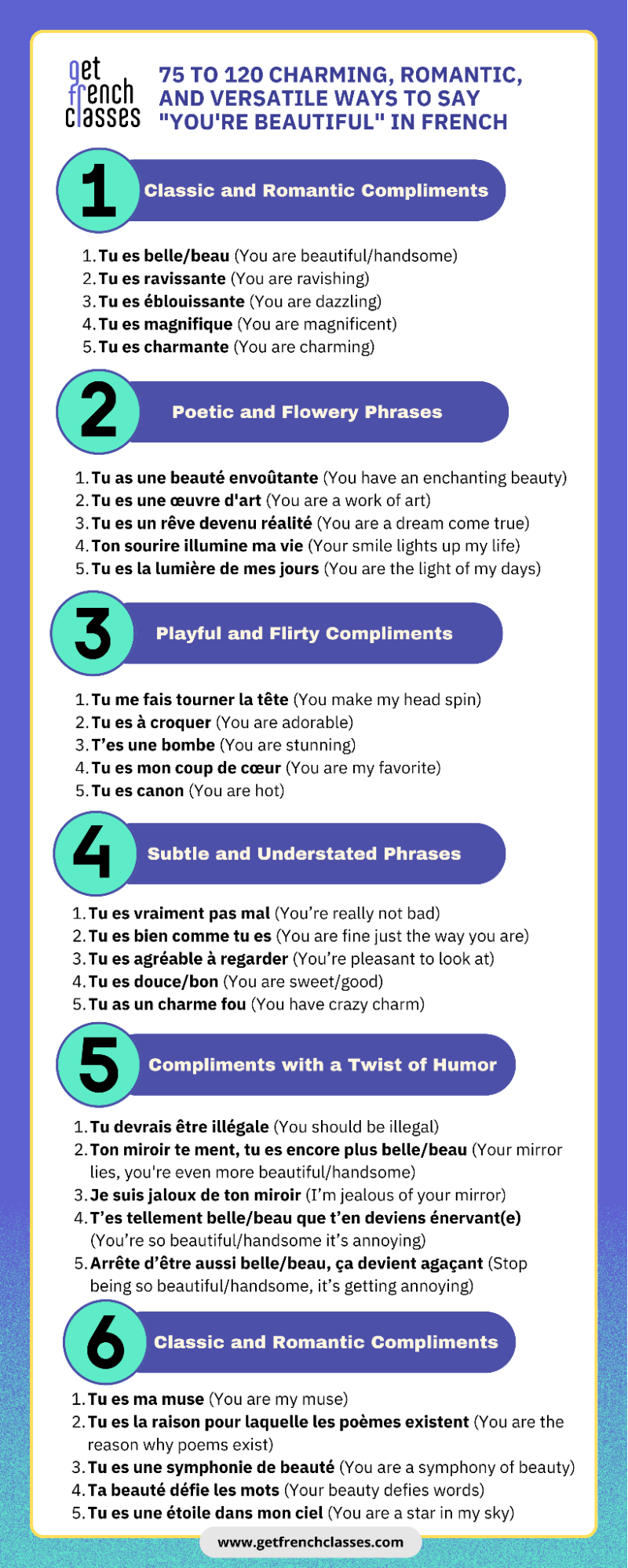
Quick warning: If you're learning French, never fall into the trap of confusing masculine nouns with feminine nouns—it could completely change the meaning of your sentence, leading to embarrassing misunderstandings and frustrations.
In this article, we’ll explore over 75 ways to say “you’re beautiful” in French, covering a wide range of contexts from casual compliments to romantic declarations. We’ll also delve into the cultural nuances of giving compliments in French-speaking countries and provide you with tips to sound like a native speaker.
When is "you're beautiful" used in French?
In French, the use of beauty compliments varies depending on the gender of the noun being described. For instance, when complimenting a woman, you would use the adjective 'belle' because it is specifically used for feminine nouns.
On the other hand, when complimenting a man, you would use 'beau,' which is used for masculine nouns. This distinction is crucial for accurate language use and ensures that the descriptive words match the gender of the nouns they modify.
How to say "you're beautiful" in French in 75+ ways (feminine and masculine forms)

The French language offers a rich variety of expressions to convey beauty and admiration. However, choosing the right compliment depends on several factors:
-
Relationship with the person: The level of intimacy or formality between you and the person you’re complimenting
-
Formality of the situation: Whether you’re in a casual, professional, or romantic setting
-
Gender of the person being complimented: Some expressions are gender-specific in French
-
Whether complimenting a person, object, or concept: Different phrases are used for people versus things
-
Intensity of the compliment: From mild appreciation to passionate declarations of beauty
Keep these factors in mind as we explore the many ways to express beauty in French. We will also provide a few examples of how to use these expressions in real-life contexts.
How to say "you're beautiful" to a woman in French
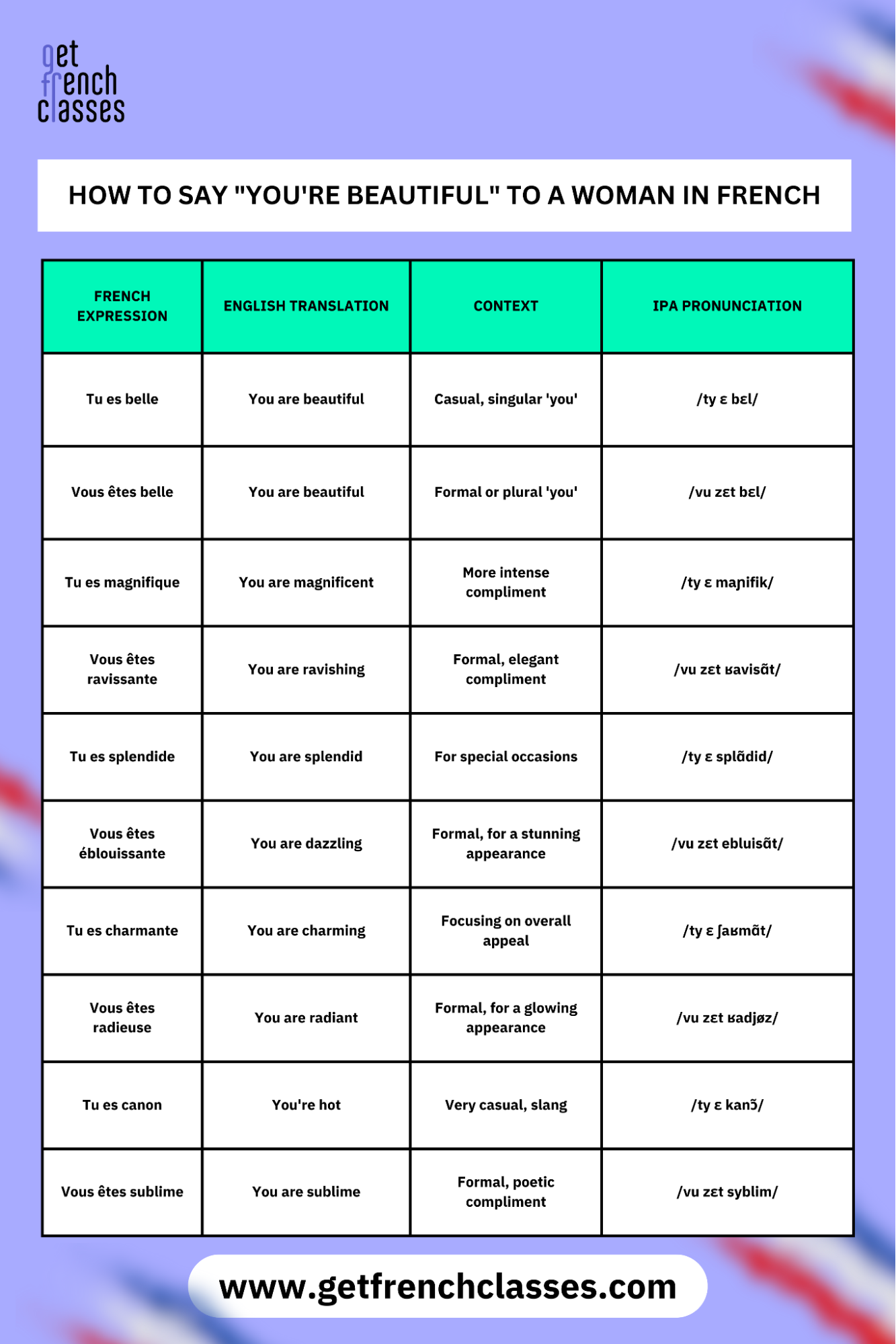
Complimenting a woman's beauty in French requires finesse and an understanding of context. From casual appreciations to romantic declarations, here's how to express admiration appropriately.
| French Expression | English Translation | Context | IPA Pronunciation |
|---|---|---|---|
| Tu es belle | You are beautiful | Casual, singular 'you' | /ty ɛ bɛl/ |
| Vous êtes belle | You are beautiful | Formal or feminine plural 'you' | /vu zɛt bɛl/ |
| Tu es magnifique | You are magnificent | More intense compliment | /ty ɛ maɲifik/ |
| Vous êtes ravissante | You are ravishing | Formal, elegant compliment | /vu zɛt ʁavisɑ̃t/ |
| Tu es splendide | You are splendid | For special occasions | /ty ɛ splɑ̃did/ |
| Vous êtes éblouissante | You are dazzling | Formal, for a stunning appearance | /vu zɛt ebluisɑ̃t/ |
| Tu es charmante | You are charming | Focusing on overall appeal | /ty ɛ ʃaʁmɑ̃t/ |
| Vous êtes radieuse | You are radiant | Formal, for a glowing appearance | /vu zɛt ʁadjøz/ |
| Tu es canon | You're hot | Very casual, slang | /ty ɛ kanɔ̃/ |
| Vous êtes sublime | You are sublime | Formal, poetic compliment | /vu zɛt syblim/ |
Examples and explanations of nuances:
-
"Tu es belle" vs. "Vous êtes belle" : The first is used with friends, family, or in casual settings, while the second is for formal situations or when addressing someone older or in a position of authority.
-
"Tu es magnifique" vs. "Tu es splendide" : While both are intense compliments, "magnifique" is more versatile and can be used in various contexts. "Splendide" often implies a special occasion or exceptional appearance.
-
"Vous êtes ravissante" vs. "Vous êtes éblouissante" : "Ravissante" suggests a charming and delightful beauty, while "éblouissante" implies a more striking, attention-grabbing appearance.
How to say "you're beautiful" to a man in French
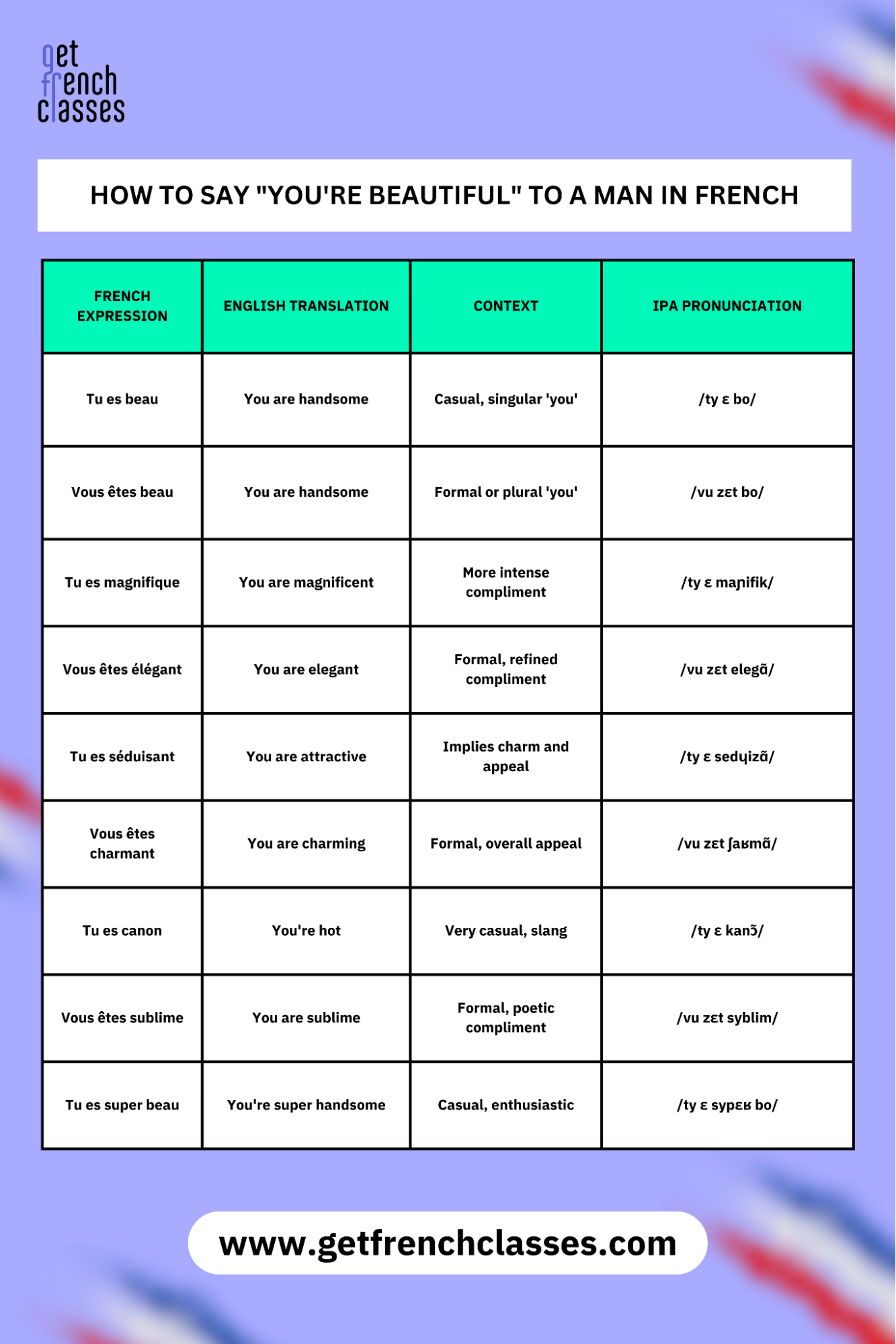
Complimenting a man’s appearance in French requires a slightly different approach. While some expressions are the same, others change form or are more commonly used for men.
For example, to say 'a handsome boy' in French language, you would use the term 'beau garçon.'
| French Expression | English Translation | Context | IPA Pronunciation |
|---|---|---|---|
| Tu es beau | You are handsome | Casual, singular ‘you’ | /ty ɛ bo/ |
| Vous êtes beau | You are handsome | Formal or masculine plural ‘you’ | /vu zɛt bo/ |
| Tu es magnifique | You are magnificent | More intense compliment | /ty ɛ maɲifik/ |
| Vous êtes élégant | You are elegant | Formal, refined compliment | /vu zɛt elegɑ̃/ |
| Tu es séduisant | You are attractive | Implies charm and appeal | /ty ɛ sedɥizɑ̃/ |
| Vous êtes charmant | You are charming | Formal, overall appeal | /vu zɛt ʃaʁmɑ̃/ |
| Tu es canon | You’re hot | Very casual, slang | /ty ɛ kanɔ̃/ |
| Vous êtes sublime | You are sublime | Formal, poetic compliment | /vu zɛt syblim/ |
| Tu es superbe | You’re super handsome | Casual, enthusiastic | /ty ɛ sypɛʁb/ |
| Vous êtes très séduisant | You are very attractive | Formal, emphasizing appeal | /vu zɛt tʁɛ sedɥizɑ̃/ |
Examples and explanations of nuances:
-
“Beau” vs. “Belle” : “Beau” is the masculine form of “beautiful” in French, often translated as “handsome” for men. “Belle” is used for women.
-
“Tu es séduisant” vs. “Vous êtes élégant” : “Séduisant” implies an attractive quality that goes beyond just looks, suggesting charm. “Élégant” focuses more on style and refined appearance.
-
“Tu es canon” vs. “Tu es super beau” : Both are casual compliments, but “canon” is slang and more intense, while “super beau” is enthusiastic but less edgy.
In case of formal or feminine plural, we deal mostly with the french expression "Vous êtes belle" as we will see further
It's also worth mentioning that instead of using endlessly the french word séduisant" or "élégant", you can also use the French phrase "Vous êtes bel homme."
How to compliment someone on their work in French
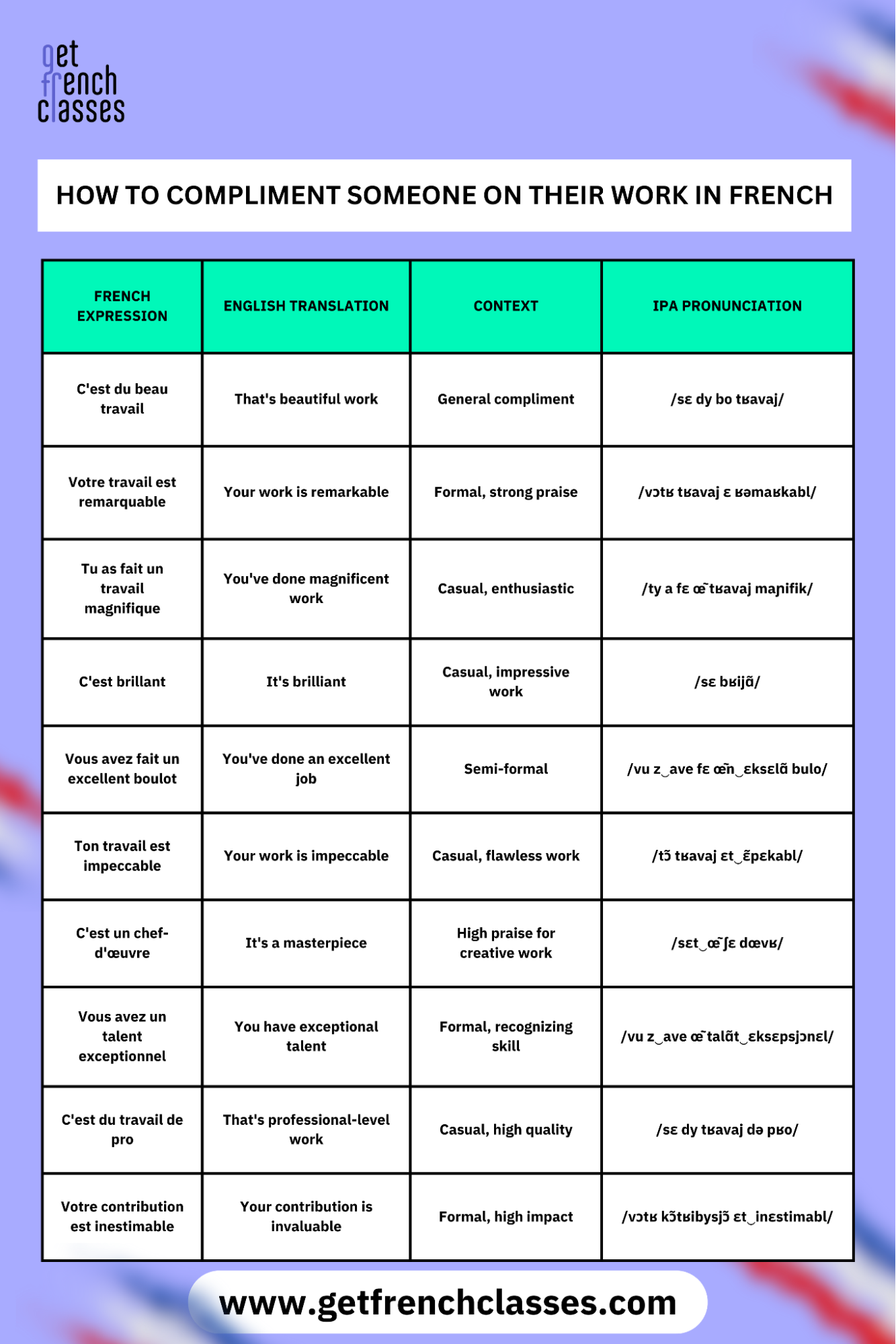
In professional settings or when appreciating someone's efforts, knowing how to compliment work in French language is invaluable. These expressions range from casual praise to formal recognition of excellence.
| French Expression | English Translation | Context | IPA Pronunciation |
|---|---|---|---|
| C'est du beau travail | That's beautiful work | General compliment | /sɛ dy bo tʁavaj/ |
| Votre travail est remarquable | Your work is remarkable | Formal, strong praise | /vɔtʁ tʁavaj ɛ ʁəmaʁkabl/ |
| Tu as fait un travail magnifique | You've done magnificent work | Casual, enthusiastic | /ty a fɛ œ̃ tʁavaj maɲifik/ |
| C'est brillant | It's brilliant | Casual, impressive work | /sɛ bʁijɑ̃/ |
| Vous avez fait un excellent boulot | You've done an excellent job | Semi-formal | /vu z‿ave fɛ œ̃n‿ɛksɛlɑ̃ bulo/ |
| Ton travail est impeccable | Your work is impeccable | Casual, flawless work | /tɔ̃ tʁavaj ɛt‿ɛ̃pɛkabl/ |
| C'est un chef-d'œuvre | It's a masterpiece | High praise for creative work | /sɛt‿œ̃ ʃɛ dœvʁ/ |
| Vous avez un talent exceptionnel | You have exceptional talent | Formal, recognizing skill | /vu z‿ave œ̃ talɑ̃t‿ɛksɛpsjɔnɛl/ |
| C'est du travail de pro | That's professional-level work | Casual, high quality | /sɛ dy tʁavaj də pʁo/ |
| Votre contribution est inestimable | Your contribution is invaluable | Formal, high impact | /vɔtʁ kɔ̃tʁibysjɔ̃ ɛt‿inɛstimabl/ |
Examples and explanations of nuances:
-
"C'est du beau travail" vs. "Votre travail est remarquable" : The first is more casual and can be used in everyday situations, while the second is more formal and emphasizes the exceptional nature of the work.
-
"Tu as fait un travail magnifique" vs. "Vous avez fait un excellent boulot" : Both express strong approval, but the first is more casual (using "tu") and emphasizes the beauty of the work, while the second is semi-formal (using "vous") and focuses on the quality of the job done.
-
"C'est un chef-d'œuvre" vs. "C'est brillant" : "Chef-d'œuvre" is a very high compliment, typically reserved for creative or artistic work, while "brillant" is more versatile and can apply to various types of impressive work or ideas.
How to compliment someone's physical appearance in French
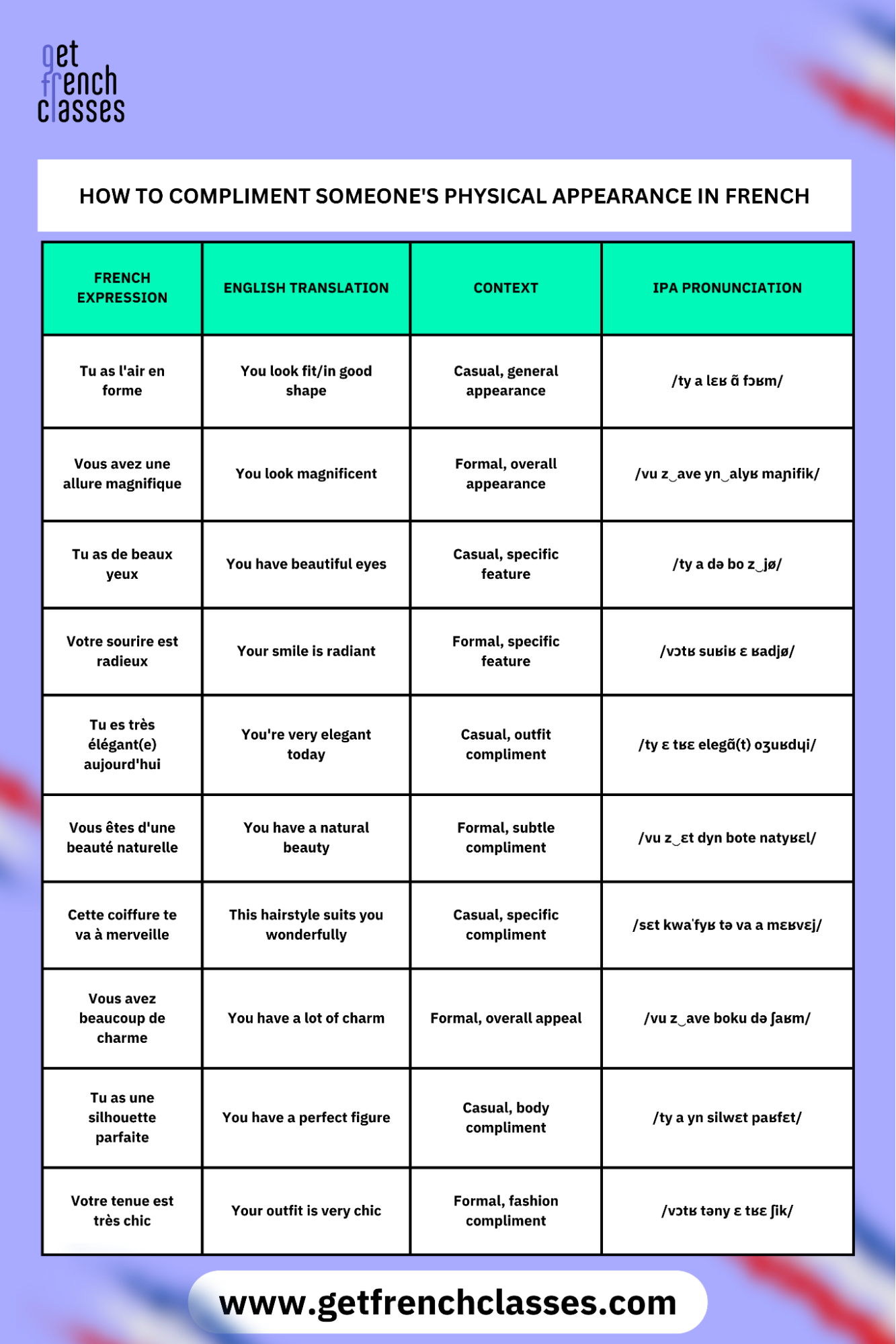
Complimenting physical appearance in French requires tact and awareness of social norms. These expressions cover various aspects of appearance, from overall looks to specific features.
To express admiration for a French girl, you might say "Tu es très belle" which means "You are very beautiful" in English.
| French Expression | English Translation | Context | IPA Pronunciation |
|---|---|---|---|
| Tu as l’air en forme | You look fit/in good shape | Casual, general appearance | /ty a lɛʁ ɑ̃ fɔʁm/ |
| Vous avez une allure magnifique | You look magnificent | Formal, overall appearance | /vu z‿ave yn‿alyʁ maɲifik/ |
| Tu as de beaux yeux | You have beautiful eyes | Casual, specific feature | /ty a də bo z‿jø/ |
| Votre sourire est radieux | Your smile is radiant | Formal, specific feature | /vɔtʁ suʁiʁ ɛ ʁadjø/ |
| Tu es très élégant(e) aujourd’hui | You’re very elegant today | Casual, outfit compliment | /ty ɛ tʁɛ elegɑ̃(t) oʒuʁdɥi/ |
| Vous êtes d’une beauté naturelle | You have a natural beauty | Formal, subtle compliment | /vu z‿ɛt dyn bote natyʁɛl/ |
| Cette coiffure te va à merveille | This hairstyle suits you wonderfully | Casual, specific compliment | /sɛt kwaˈfyʁ tə va a mɛʁvɛj/ |
| Vous avez beaucoup de charme | You have a lot of charm | Formal, overall appeal | /vu z‿ave boku də ʃaʁm/ |
| Tu as une silhouette parfaite | You have a perfect figure | Casual, body compliment | /ty a yn silwɛt paʁfɛt/ |
| Votre tenue est très chic | Your outfit is very chic | Formal, fashion compliment | /vɔtʁ təny ɛ tʁɛ ʃik/ |
Examples and explanations of nuances:
-
“Tu as l’air en forme” vs. “Vous avez une allure magnifique” : The first is a casual way to compliment someone’s general appearance and health, while the second is more formal and emphasizes a striking overall appearance.
-
“Tu as de beaux yeux” vs. “Votre sourire est radieux” : Both compliment specific features, but the first is more direct and casual, while the second is more formal and poetic.
-
“Tu es très élégant(e) aujourd’hui” vs. “Vous êtes d’une beauté naturelle” : The first compliments a specific look or outfit, implying effort put into appearance, while the second is a more subtle compliment on inherent beauty, regardless of specific styling.
Remember, when complimenting physical appearance in French (or any language), it’s important to be respectful and considerate of the context and your relationship with the person you’re complimenting.
How to compliment someone's personality or inner beauty in French
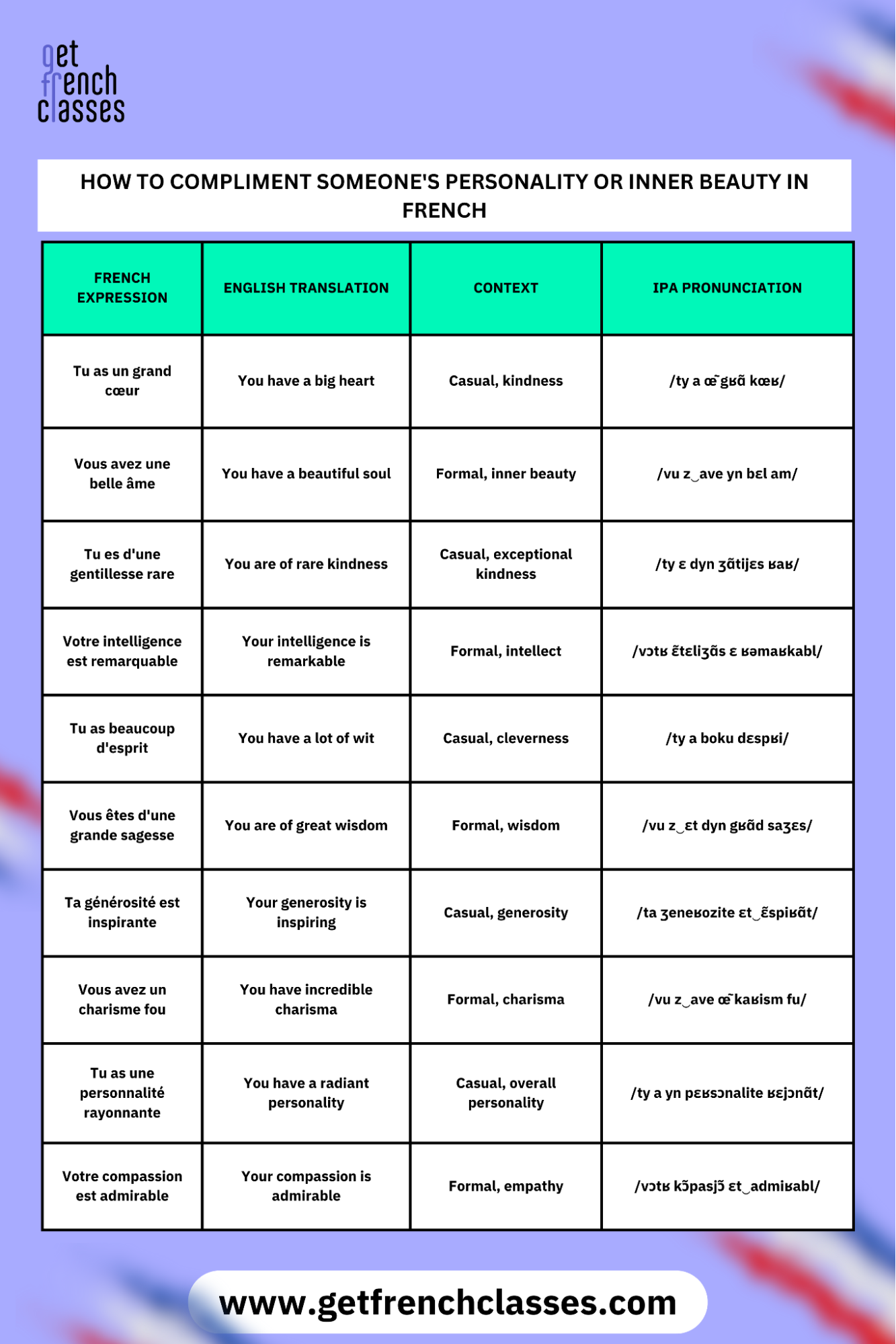
In French culture, complimenting someone's personality or inner qualities is highly valued. These expressions go beyond physical appearance to appreciate a person's character, kindness, or intellect.
| French Expression | English Translation | Context | IPA Pronunciation |
|---|---|---|---|
| Tu as un grand cœur | You have a big heart | Casual, kindness | /ty a œ̃ gʁɑ̃ kœʁ/ |
| Vous avez une belle âme | You have a beautiful soul | Formal, inner beauty | /vu z‿ave yn bɛl am/ |
| Tu es d'une gentillesse rare | You are of rare kindness | Casual, exceptional kindness | /ty ɛ dyn ʒɑ̃tijɛs ʁaʁ/ |
| Votre intelligence est remarquable | Your intelligence is remarkable | Formal, intellect | /vɔtʁ ɛ̃tɛliʒɑ̃s ɛ ʁəmaʁkabl/ |
| Tu as beaucoup d'esprit | You have a lot of wit | Casual, cleverness | /ty a boku dɛspʁi/ |
| Vous êtes d'une grande sagesse | You are of great wisdom | Formal, wisdom | /vu z‿ɛt dyn gʁɑ̃d saʒɛs/ |
| Ta générosité est inspirante | Your generosity is inspiring | Casual, generosity | /ta ʒeneʁozite ɛt‿ɛ̃spiʁɑ̃t/ |
| Vous avez un charisme fou | You have incredible charisma | Formal, charisma | /vu z‿ave œ̃ kaʁism fu/ |
| Tu as une personnalité rayonnante | You have a radiant personality | Casual, overall personality | /ty a yn pɛʁsɔnalite ʁɛjɔnɑ̃t/ |
| Votre compassion est admirable | Your compassion is admirable | Formal, empathy | /vɔtʁ kɔ̃pasjɔ̃ ɛt‿admiʁabl/ |
Examples and explanations of nuances:
-
"Tu as un grand cœur" vs. "Vous avez une belle âme" : Both compliment inner beauty, but "grand cœur" focuses on kindness and generosity, while "belle âme" encompasses overall inner beauty and moral qualities.
-
"Tu es d'une gentillesse rare" vs. "Votre compassion est admirable" : The first is a more casual way to compliment exceptional kindness, while the second is formal and specifically praises empathy and understanding.
-
"Tu as beaucoup d'esprit" vs. "Votre intelligence est remarquable" : "Beaucoup d'esprit" compliments quick wit and cleverness in a casual way, while "intelligence remarquable" is a formal acknowledgment of overall intellectual capacity.
How to say something is beautiful in French (Objects or concepts)
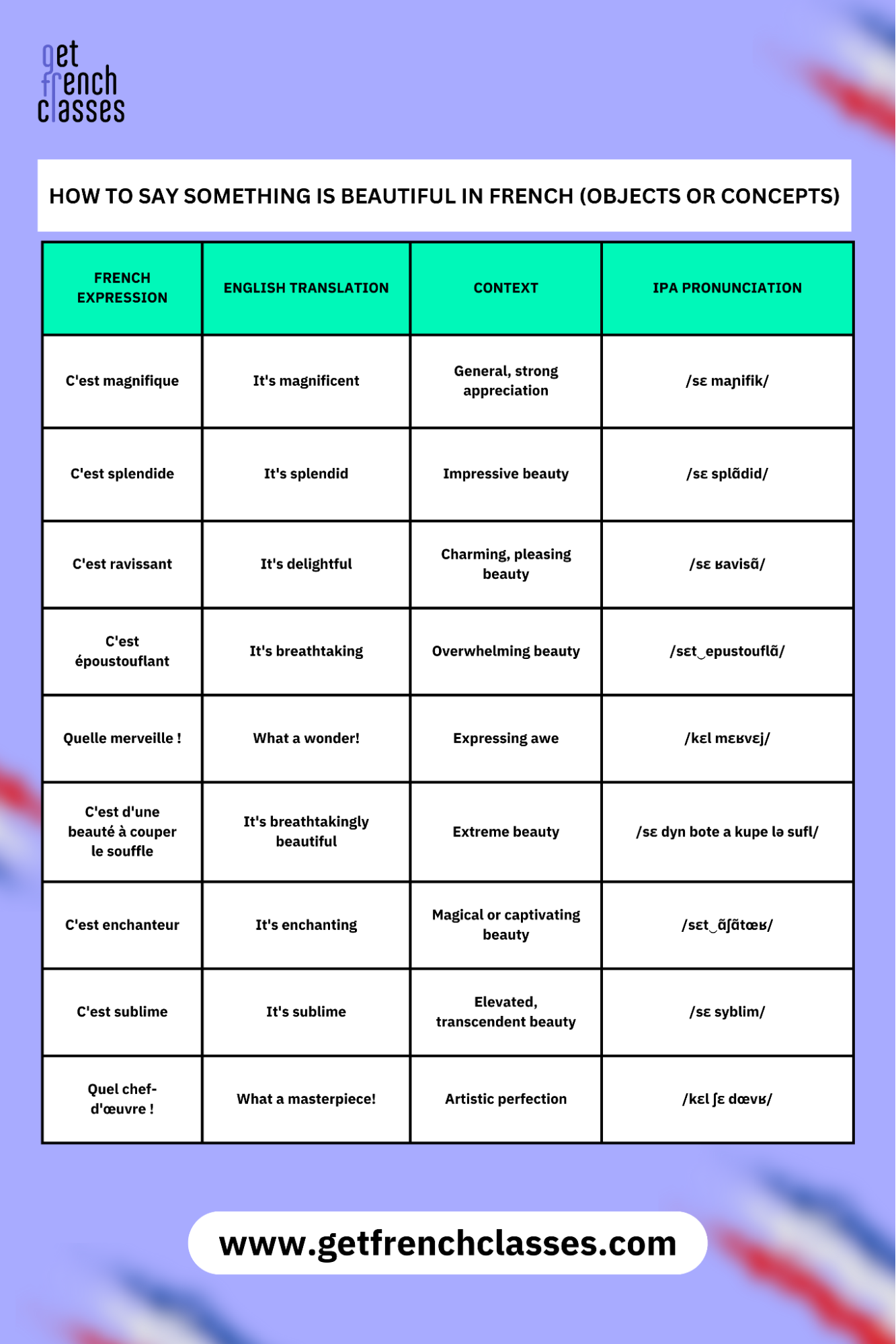
French offers a rich vocabulary to describe the beauty of objects, places, or abstract concepts, often utilizing a specific French word to capture the essence of beauty. These expressions allow you to articulate appreciation for various forms of beauty in your surroundings.
| French Expression | English Translation | Context | IPA Pronunciation |
|---|---|---|---|
| C’est magnifique | It’s magnificent | General, strong appreciation | /sɛ maɲifik/ |
| C’est splendide | It’s splendid | Impressive beauty | /sɛ splɑ̃did/ |
| C’est ravissant | It’s delightful | Charming, pleasing beauty | /sɛ ʁavisɑ̃/ |
| C’est époustouflant | It’s breathtaking | Overwhelming beauty | /sɛt‿epustouflɑ̃/ |
| Quelle merveille ! | What a wonder! | Expressing awe | /kɛl mɛʁvɛj/ |
| C’est d’une beauté à couper le souffle | It’s breathtakingly beautiful | Extreme beauty | /sɛ dyn bote a kupe lə sufl/ |
| C’est enchanteur | It’s enchanting | Magical or captivating beauty | /sɛt‿ɑ̃ʃɑ̃tœʁ/ |
| C’est sublime | It’s sublime | Elevated, transcendent beauty | /sɛ syblim/ |
| Quel chef-d’œuvre ! | What a masterpiece! | Artistic perfection | /kɛl ʃɛ dœvʁ/ |
| C’est d’une élégance rare | It’s of rare elegance | Refined, exceptional beauty | /sɛ dyn elegɑ̃s ʁaʁ/ |
Examples and explanations of nuances:
-
“C’est magnifique” vs. “C’est splendide” : Both express strong appreciation, but “magnifique” is more versatile and commonly used, while “splendide” often implies a more formal or grand type of beauty.
-
“C’est ravissant” vs. “C’est époustouflant” : “Ravissant” suggests a charming, delightful kind of beauty, while “époustouflant” implies a more dramatic, overwhelming beauty that surprises or amazes.
-
“C’est enchanteur” vs. “C’est sublime” : “Enchanteur” evokes a magical or captivating quality, often used for experiences or atmospheres, while “sublime” suggests a higher, almost transcendent form of beauty.
Romantic ways to say "you're beautiful" in French
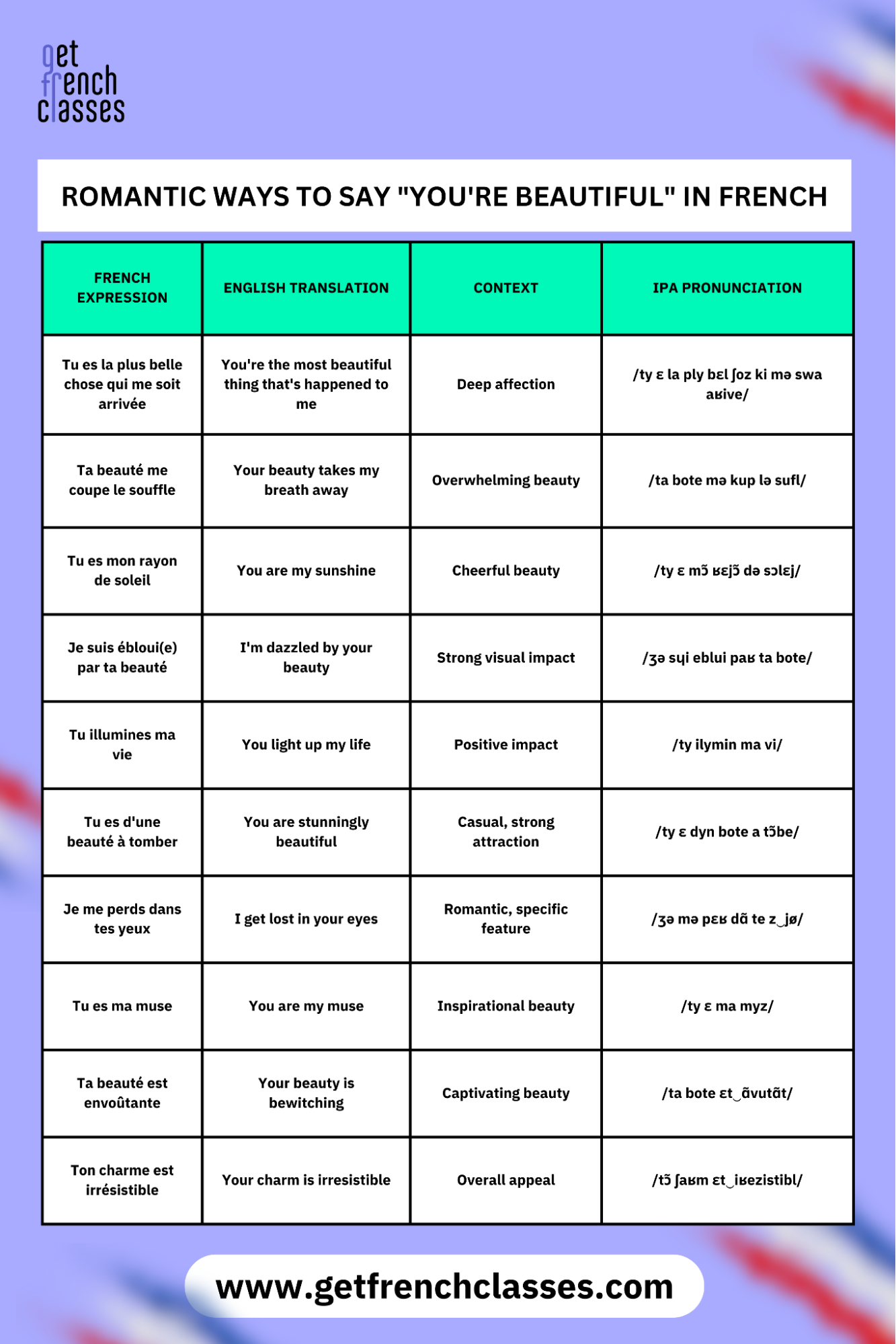
French is often called the language of love, and these romantic expressions of beauty live up to that reputation. Use these phrases to convey deep admiration and affection in romantic contexts. The word 'belle' is frequently used in French language to describe beauty, especially in feminine forms, and it appears in many idiomatic phrases that highlight its cultural significance.
| French Expression | English Translation | Context | IPA Pronunciation |
|---|---|---|---|
| Tu es la plus belle chose qui me soit arrivée | You’re the most beautiful thing that’s happened to me | Deep affection | /ty ɛ la ply bɛl ʃoz ki mə swa aʁive/ |
| Ta beauté me coupe le souffle | Your beauty takes my breath away | Overwhelming beauty | /ta bote mə kup lə sufl/ |
| Tu es mon rayon de soleil | You are my sunshine | Cheerful beauty | /ty ɛ mɔ̃ ʁɛjɔ̃ də sɔlɛj/ |
| Je suis ébloui(e) par ta beauté | I’m dazzled by your beauty | Strong visual impact | /ʒə sɥi eblui paʁ ta bote/ |
| Tu illumines ma vie | You light up my life | Positive impact | /ty ilymin ma vi/ |
| Tu es d’une beauté à tomber | You are stunningly beautiful | Casual, strong attraction | /ty ɛ dyn bote a tɔ̃be/ |
| Je me perds dans tes yeux | I get lost in your eyes | Romantic, specific feature | /ʒə mə pɛʁ dɑ̃ te z‿jø/ |
| Tu es ma muse | You are my muse | Inspirational beauty | /ty ɛ ma myz/ |
| Ta beauté est envoûtante | Your beauty is bewitching | Captivating beauty | /ta bote ɛt‿ɑ̃vutɑ̃t/ |
| Ton charme est irrésistible | Your charm is irresistible | Overall appeal | /tɔ̃ ʃaʁm ɛt‿iʁezistibl/ |
Examples and explanations of nuances:
-
“Tu es la plus belle chose qui me soit arrivée” vs. “Tu es mon rayon de soleil” : The first is a profound declaration of the person’s impact on your life, while the second is a lighter, more cheerful expression of how the person brightens your day.
-
“Je suis ébloui(e) par ta beauté” vs. “Ta beauté est envoûtante” : “Ébloui(e)” suggests being visually struck or dazzled by beauty, while “envoûtante” implies a more mysterious, captivating kind of beauty that holds you under its spell.
-
“Tu es d’une beauté à tomber” vs. “Ton charme est irrésistible” : The first is a more casual, modern expression focusing on physical beauty, while the second emphasizes overall charm and appeal beyond just looks.
Remember, these romantic expressions are quite intense and should be used sincerely in appropriate contexts. Learning French, you will realize that French culture often appreciates subtlety in romance, so consider the relationship and setting when using these phrases.
Casual and slang ways to say "you're beautiful" in French
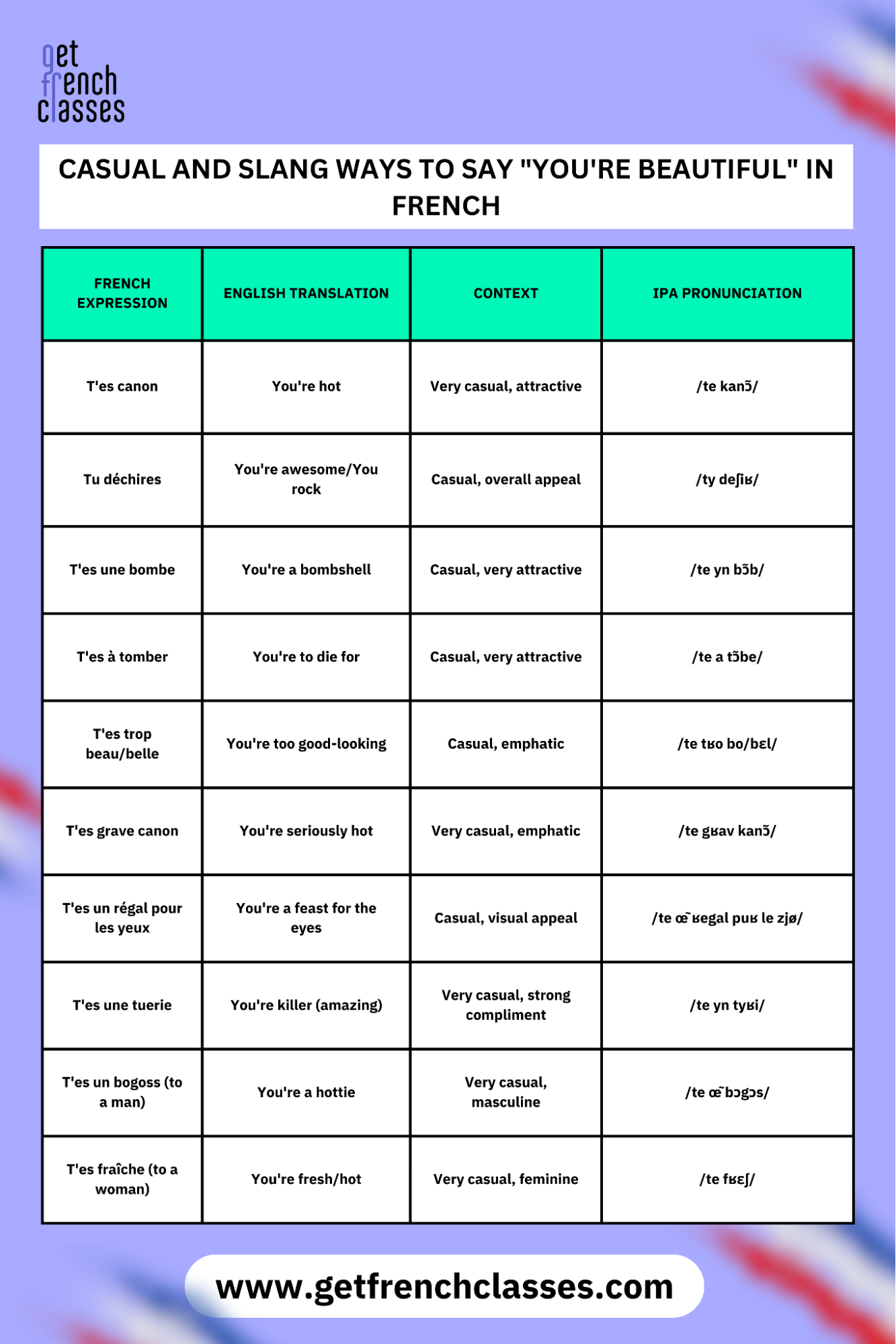
In everyday French, especially among younger people, there are many casual and slang expressions using French words to compliment someone’s appearance. These phrases are more relaxed and often used among friends or in informal settings.
| French Expression | English Translation | Context | IPA Pronunciation |
|---|---|---|---|
| T’es canon | You’re hot | Very casual, attractive | /te kanɔ̃/ |
| Tu déchires | You’re awesome/You rock | Casual, overall appeal | /ty deʃiʁ/ |
| T’es une bombe | You’re a bombshell | Casual, very attractive | /te yn bɔ̃b/ |
| T’es à tomber | You’re to die for | Casual, very attractive | /te a tɔ̃be/ |
| T’es trop beau/belle | You’re too good-looking | Casual, emphatic | /te tʁo bo/bɛl/ |
| T’es grave canon | You’re seriously hot | Very casual, emphatic | /te gʁav kanɔ̃/ |
| T’es un régal pour les yeux | You’re a feast for the eyes | Casual, visual appeal | /te œ̃ ʁegal puʁ le zjø/ |
| T’es une tuerie | You’re killer (amazing) | Very casual, strong compliment | /te yn tyʁi/ |
| T’es un bogoss (to a man) | You’re a hottie | Very casual, masculine | /te œ̃ bɔgɔs/ |
| T’es fraîche (to a woman) | You’re fresh/hot (you're a beautiful woman) | Very casual, feminine | /te fʁɛʃ/ |
Examples and explanations of nuances:
-
“T’es canon” vs. “T’es une bombe” : Both are casual ways to say someone is very attractive, but “une bombe” is slightly more emphatic and often used for a striking, attention-grabbing appearance.
-
“Tu déchires” vs. “T’es une tuerie” : “Tu déchires” is a general compliment that can refer to appearance or overall awesomeness, while “T’es une tuerie” is more specifically about looks and is a stronger, more recent slang term.
-
“T’es trop beau/belle” vs. “T’es grave canon” : Both are emphatic compliments, but “trop beau/belle” is slightly more mainstream, while “grave canon” is very casual and popular among younger speakers.
Note : These expressions are very informal and should be used carefully, as they might be considered too familiar or even disrespectful in some contexts.
Poetic and literary ways to express beauty in French
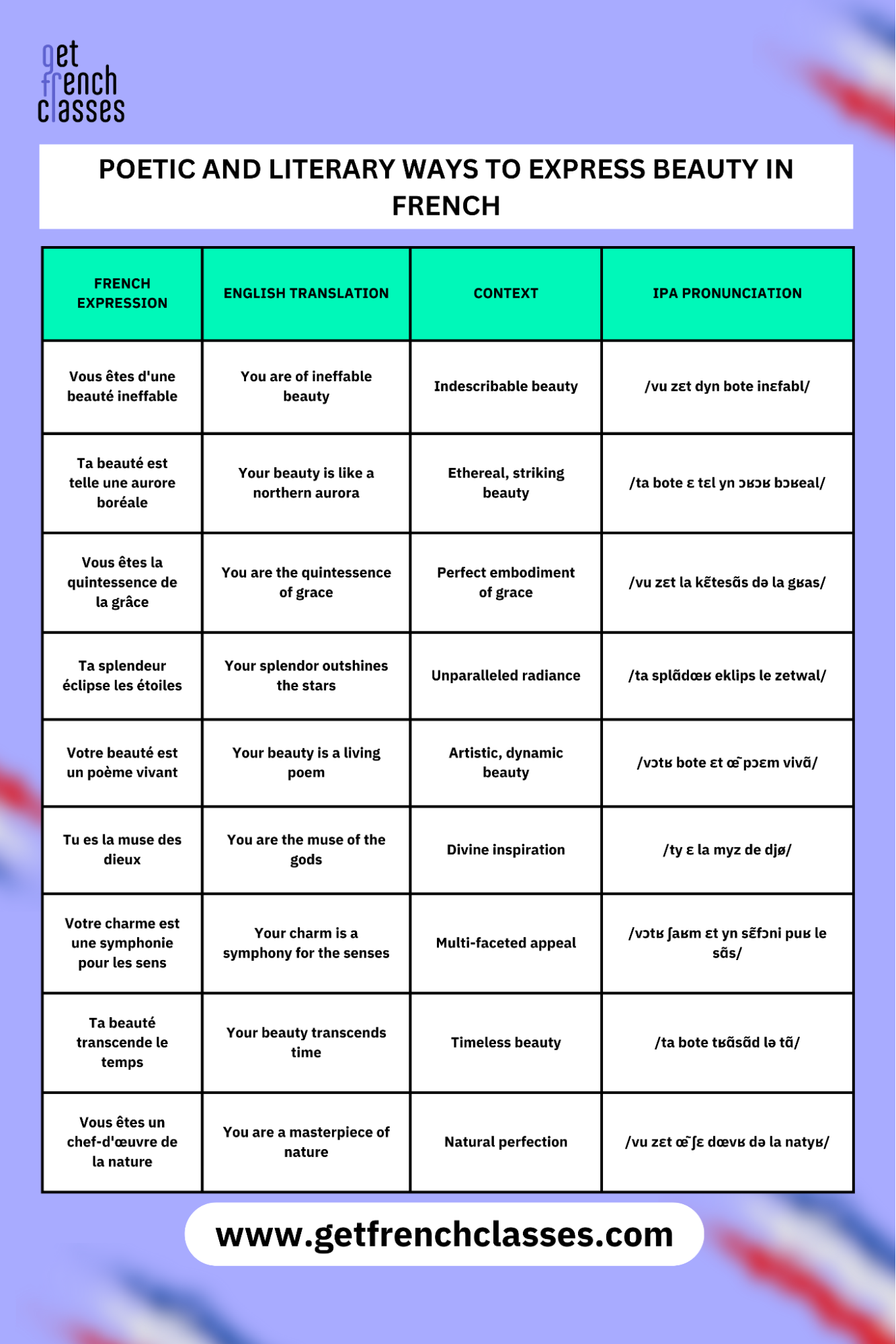
French literature and poetry have a rich tradition of expressing beauty in eloquent and sophisticated ways. These expressions are often used in writing, romantic contexts, or when one wants to convey admiration in a more refined manner. The word 'beautiful' in French literature and poetry is often used to highlight the gender agreement of adjectives and is deeply embedded in cultural significance, especially in names and descriptions.
| French Expression | English Translation | Context | IPA Pronunciation |
|---|---|---|---|
| Vous êtes d’une beauté ineffable | You are of ineffable beauty | Indescribable beauty | /vu zɛt dyn bote inɛfabl/ |
| Ta beauté est telle une aurore boréale | Your beauty is like a northern aurora | Ethereal, striking beauty | /ta bote ɛ tɛl yn ɔʁɔʁ bɔʁeal/ |
| Vous êtes la quintessence de la grâce | You are the quintessence of grace | Perfect embodiment of grace | /vu zɛt la kɛ̃tesɑ̃s də la gʁas/ |
| Ta splendeur éclipse les étoiles | Your splendor outshines the stars | Unparalleled radiance | /ta splɑ̃dœʁ eklips le zetwal/ |
| Votre beauté est un poème vivant | Your beauty is a living poem | Artistic, dynamic beauty | /vɔtʁ bote ɛt œ̃ pɔɛm vivɑ̃/ |
| Tu es la muse des dieux | You are the muse of the gods | Divine inspiration | /ty ɛ la myz de djø/ |
| Votre charme est une symphonie pour les sens | Your charm is a symphony for the senses | Multi-faceted appeal | /vɔtʁ ʃaʁm ɛt yn sɛ̃fɔni puʁ le sɑ̃s/ |
| Ta beauté transcende le temps | Your beauty transcends time | Timeless beauty | /ta bote tʁɑ̃sɑ̃d lə tɑ̃/ |
| Vous êtes un chef-d’œuvre de la nature | You are a masterpiece of nature | Natural perfection | /vu zɛt œ̃ ʃɛ dœvʁ də la natyʁ/ |
| Ta présence illumine le monde | Your presence illuminates the world | Transformative beauty | /ta pʁezɑ̃s ilymin lə mɔ̃d/ |
Examples and explanations of nuances:
-
“Vous êtes d’une beauté ineffable” vs. “Votre beauté est un poème vivant” : The first expresses beauty that defies description, while the second compares beauty to a living, evolving work of art.
-
“Ta beauté est telle une aurore boréale” vs. “Ta splendeur éclipse les étoiles” : Both use celestial imagery, but the aurora comparison suggests a rare, ethereal beauty, while outshining the stars implies a more radiant, attention-commanding beauty.
-
“Vous êtes la quintessence de la grâce” vs. “Vous êtes un chef-d’œuvre de la nature” : The first focuses on the embodiment of a specific quality (grace), while the second presents the person as a perfect creation of nature in all aspects.
These poetic expressions are typically reserved for written declarations of love, poetry, or very special romantic moments. They carry a level of intensity and sophistication that might feel exaggerated in everyday conversation.
The culture of compliments in French culture
In France, the art of giving and receiving compliments is a nuanced affair, deeply rooted in cultural norms that value subtlety, sincerity, and context. Unlike some cultures where effusive praise is common, French compliment culture leans towards restraint and specificity.
French people typically offer compliments with a measured approach, preferring thoughtful, well-crafted remarks over general or casual praise.
This doesn't stem from a lack of appreciation, but rather from a cultural inclination towards understatement and a keen awareness of social context. A well-timed, specific compliment that demonstrates genuine observation is highly valued in French society.
The frequency and intensity of compliments in France differ notably from some other cultures, particularly when compared to the American approach. Compliments are generally given less frequently, and when offered, they tend to be more subdued in their delivery.
This measured approach reflects a cultural preference for sincerity over enthusiasm. Excessive or hyperbolic compliments might be viewed with skepticism or as an attempt to ingratiate oneself.
Context also plays a crucial role in French compliment culture.
-
In professional settings, compliments are typically more reserved and focused on work-related achievements.
-
Personal settings allow for warmer, more frequent compliments, but still within the bounds of moderation.
This context-sensitivity extends to the relationship between individuals, with compliments between close friends differing from those exchanged in more formal relationships.
When receiving compliments, French people often respond with modesty. It's common to slightly downplay a compliment or deflect it with a humble response.
This doesn't indicate a rejection of the compliment but aligns with cultural expectations of modesty. Non-verbal communication, such as a slight smile or nod, can be as effective as a verbal response in acknowledging a compliment.
It's important to respect personal boundaries as well, particularly regarding compliments about physical appearance. In professional settings, focus on actions, achievements, or qualities rather than physical attributes.
Be prepared for modest responses, and don't be surprised if your compliment is met with a deflection – this is a cultural norm, not a rejection.
How to respond to compliments in French
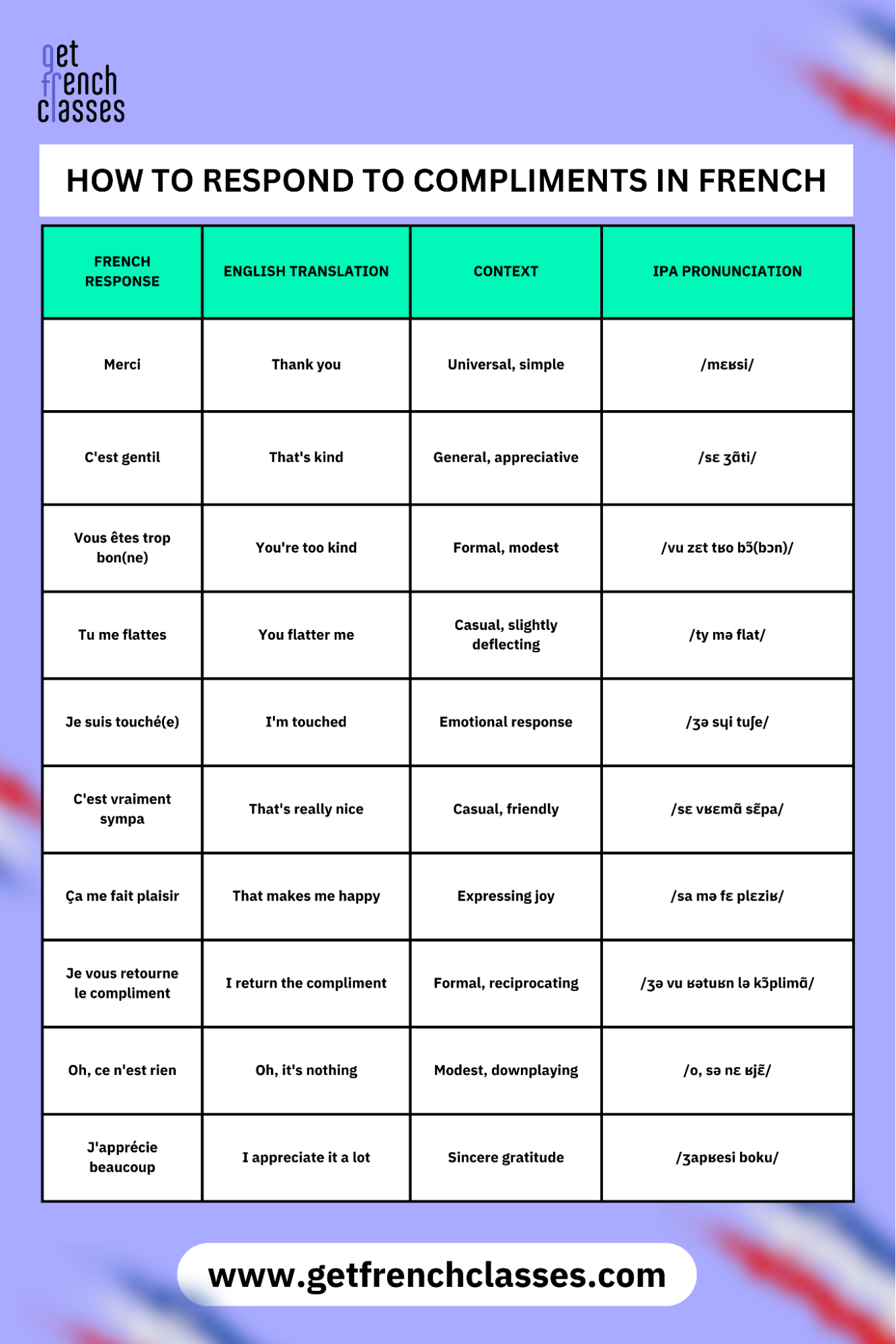
Responding to compliments in French requires a delicate balance between graciousness and modesty. Understanding the cultural nuances can help you navigate these social interactions with ease and charm.
Common responses to compliments in French
Here's a table of common responses to compliments, ranging from casual to more formal situations:
| French Response | English Translation | Context | IPA Pronunciation |
|---|---|---|---|
| Merci | Thank you | Universal, simple | /mɛʁsi/ |
| C'est gentil | That's kind | General, appreciative | /sɛ ʒɑ̃ti/ |
| Vous êtes trop bon(ne) | You're too kind | Formal, modest | /vu zɛt tʁo bɔ̃(bɔn)/ |
| Tu me flattes | You flatter me | Casual, slightly deflecting | /ty mə flat/ |
| Je suis touché(e) | I'm touched | Emotional response | /ʒə sɥi tuʃe/ |
| C'est vraiment sympa | That's really nice | Casual, friendly | /sɛ vʁɛmɑ̃ sɛ̃pa/ |
| Ça me fait plaisir | That makes me happy | Expressing joy | /sa mə fɛ plɛziʁ/ |
| Je vous retourne le compliment | I return the compliment | Formal, reciprocating | /ʒə vu ʁətuʁn lə kɔ̃plimɑ̃/ |
| Oh, ce n'est rien | Oh, it's nothing | Modest, downplaying | /o, sə nɛ ʁjɛ̃/ |
| J'apprécie beaucoup | I appreciate it a lot | Sincere gratitude | /ʒapʁesi boku/ |
Cultural expectations when receiving compliments
In French culture, there are certain expectations and norms when it comes to receiving compliments:
-
Modesty is valued : It's common to downplay compliments slightly rather than fully embracing them.
-
Avoid outright rejection : While modesty is appreciated, completely dismissing a compliment can be seen as impolite.
-
Reciprocity is welcome : It's often considered polite to return a compliment, but it should be sincere.
-
Brevity is key : Long explanations or justifications for why you deserve the compliment are generally avoided.
-
Non-verbal cues matter : A smile and a nod can sometimes be sufficient to acknowledge a compliment.
-
Context is important : Responses may vary depending on the formality of the situation and your relationship with the person giving the compliment.
-
Sincerity is appreciated : Even if being modest, a genuine "thank you" is always well-received.
Examples of humble and gracious ways to accept compliments
Here are some scenarios demonstrating humble and gracious ways to accept compliments in French:
-
On your appearance: Compliment : "Vous êtes très élégant(e) ce soir." (You look very elegant tonight.)
Response : "Merci, c'est gentil à vous de le remarquer." (Thank you, it's kind of you to notice.)
2. On your work:
Compliment : "Votre présentation était brillante." (Your presentation was brilliant.)
Response : "Je vous remercie. J'ai travaillé dur dessus." (Thank you. I worked hard on it.)
3. On your cooking:
Compliment : "Ce plat est délicieux !" (This dish is delicious!)
Response : "Je suis ravi(e) que ça vous plaise. La recette est de ma grand-mère." (I'm delighted you like it. It's my grandmother's recipe.)
4. On your French language skills:
Compliment : "Votre français est impressionnant." (Your French is impressive.)
Response : "C'est gentil, mais j'ai encore beaucoup à apprendre." (That's kind, but I still have a lot to learn.)
5. On a personal quality:
Compliment : "Vous êtes toujours si patient(e)." (You're always so patient.)
Response : "Merci, j'essaie de faire de mon mieux." (Thank you, I try to do my best.)
Remember, the key is to acknowledge the compliment graciously while maintaining a modest demeanor. This balance aligns well with French cultural expectations and will help you navigate social interactions smoothly.
How to say "you're beautiful" in French FAQ
Is it appropriate to compliment strangers in French?
Complimenting strangers in French culture is less common and can be seen as forward or even intrusive. The French generally value privacy and maintain clearer boundaries with strangers compared to some other cultures. However, context matters:
-
In social settings like parties or events, a polite compliment might be more acceptable.
-
In professional or formal situations, it's best to avoid personal compliments to strangers.
-
If you must compliment a stranger, keep it brief, specific, and non-personal. For example, complimenting someone's dog or their choice of book is safer than commenting on their appearance.
How do compliments differ between Quebec French and France French?
While the core language is the same, there are some differences in compliment culture between Quebec and France:
-
Quebec French tends to be more influenced by North American culture, sometimes resulting in slightly more frequent and expressive compliments.
-
In Quebec, you might hear "T'es belle" more often than "Tu es belle," reflecting the more relaxed pronunciation.
-
Some expressions are unique to Quebec, like "T'es pas pire" (You're not bad) as a compliment.
-
France French might use more subtle or understated compliments, while Quebec French can be more direct.
-
Both cultures value sincerity in compliments, but the delivery might differ slightly.
Are there any compliments that are considered outdated or offensive in modern French?
Some compliments have fallen out of favor or can be seen as offensive in modern French:
-
Overly gendered compliments like "Vous êtes ravissante, Mademoiselle" can be seen as outdated or sexist.
-
Comments that are too focused on physical attributes, especially in professional settings, are increasingly frowned upon.
-
The term "Mademoiselle" itself is considered outdated by many and has been officially removed from government documents.
-
Compliments that make assumptions about a person's background or ethnicity should be avoided.
-
Overly familiar terms like "ma belle" or "mon chou" from strangers can be seen as condescending or inappropriate.
How can I practice giving compliments in French?
To practice giving compliments in French:
-
Start with simple, sincere compliments in your daily life, even if just to yourself or objects around you.
-
Use language exchange apps or forums to practice with native speakers.
-
Watch French movies or TV shows and try formulating compliments for the characters.
-
Participate in French conversation groups and incorporate compliments naturally in discussions.
-
Write short scenarios or dialogues involving compliments to practice different contexts.
-
Record yourself giving compliments to improve pronunciation and delivery.
Are there any famous French words or quotes about beauty I can use?
French literature and philosophy offer many beautiful quotes about beauty. Here are a few:
-
"La beauté est dans les yeux de celui qui regarde." - Oscar Wilde (translated to French) (Beauty is in the eye of the beholder.)
-
"Il n'y a pas de beauté exquise sans quelque étrangeté dans les proportions." - Edgar Allan Poe (translated to French) (There is no exquisite beauty without some strangeness in the proportion.)
-
"La beauté sauvera le monde." - Fyodor Dostoevsky (translated to French) (Beauty will save the world.)
-
"Le beau est toujours bizarre." - Charles Baudelaire (The beautiful is always bizarre.)
-
"La beauté est la promesse du bonheur." - Stendhal (Beauty is the promise of happiness.)
